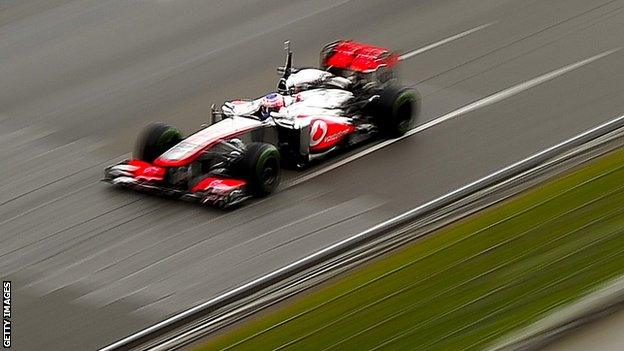McLaren poised to switch to Honda engines for 2015 season
- Published

McLaren
McLaren are to use Honda engines as the Japanese company returns to Formula 1 for the first time since 2008.
Honda pulled out of F1 after years of poor results with its own team, which subsequently won the championship as Brawn in 2009 and is now Mercedes.
But the engine manufacturer has decided to return because of next year's introduction of turbo engines featuring energy recovery technology.
McLaren are first expected to race with Honda engines in 2015.
A McLaren spokesman said: "We never discuss media rumours about potential partners."
Mercedes, which currently supplies McLaren's engines, said it could not comment on its partner's plans, but its F1 executive director Toto Wolff said: "We are looking for a long-term engine supplier relationship with McLaren-Mercedes."
McLaren has a contract with Mercedes with options for the team to renew for 2014 and 2015. McLaren are expected to take up only the first of those options.
Honda president Takanobu Ito on 8 February admitted that the company was "studying" the idea of an F1 return.
The company has not yet officially confirmed its plans to return.
The McLaren-Honda deal revives a partnership that had great historical success.
McLaren, with Honda as an engine supplier, dominated F1 in the late 1980s and early 1990s, winning four consecutive world drivers' championships with Ayrton Senna and Alain Prost, as well as the corresponding years' constructors' titles.
In 1988, McLaren with Senna and Prost enjoyed the most successful season in F1 history, winning 15 of the 16 races.
Honda also dominated the mid-1980s with Williams, winning the 1987 drivers' title with Nelson Piquet and the 1986 and 1987 constructors' championships.
Honda would become the fourth road-car manufacturer supplying engines in F1, alongside Mercedes, Renault and Ferrari (Fiat).
Honda's decision to re-enter F1 vindicates the switch to the new engine formula, which has been criticised and opposed by F1 boss Bernie Ecclestone as an unnecessary expense.
Its proponents, mainly governing body the FIA and the car manufacturers already in F1, have long argued that the sport needed to abandon the current formula for 2.4-litre V8 naturally aspirated engines because they were an out-of-date technology and out of tune with the requirement for energy efficiency.
The new engines will feature extensive use of energy recovery systems, a technology that is increasingly prevalent in road cars.
Mercedes has said that it is aiming for a thermal efficiency of 40% with its new turbo engine - a figure markedly more efficient than even the best road-car diesel engines, which are in the region of 35%.
The formula promotes efficiency through a limit on the amount of fuel that can be used and is expected to further the development of such engines in road cars.
Last month, McLaren team principal Martin Whitmarsh was critical of the sport's vacillation over the new engines, which were initially planned to be introduced in 2013 before Ecclestone engineered a delay of a year.
"[Road-car] manufacturers need to see it happen now," Whitmarsh said.
"Even in the last few weeks people [have been saying]: 'Oh, should we really go V6 next year?'
"We're committed to it. Good, bad or indifferent we've got to do it now. We've been saying it for long enough, we've delayed it long enough, we've actually got to bloody well do it.
"If I was on the board of a big OEM [road-car manufacturer], I'd be saying: 'Let's wait a couple of years and see whether F1 actually does what it says it's going to do for a change.'
"So [the] combination of the world economy, the biggest recession in OEM history, uncertainty over whether we've really done it, but F1 remains a fantastic environment for brand exposure for OEM and I predict in four-five years' time we'll be back up to four or five OEMs in the sport.
"You'll have a constant churn. For some of us F1 is our core business. OEMs will be here when it suits them and it helps them sell cars or helps them differentiate the cars so they can sell them at a higher price. There is no love for the sport.
"They have to be there for rational business reasons. So creating technologies that are socially relevant, are appropriate to the automotive industry [is important].
"But we now have to prove we have the governance in our sport, that it's consistent and stable, that we're not all going to go bust. I'd hold back a bit if I was an OEM."
- Published4 March 2013
- Published3 March 2013
- Published3 March 2013
- Published3 March 2013
- Published2 March 2013
- Published2 March 2013
- Published1 March 2013
- Published1 March 2013
- Published1 March 2013